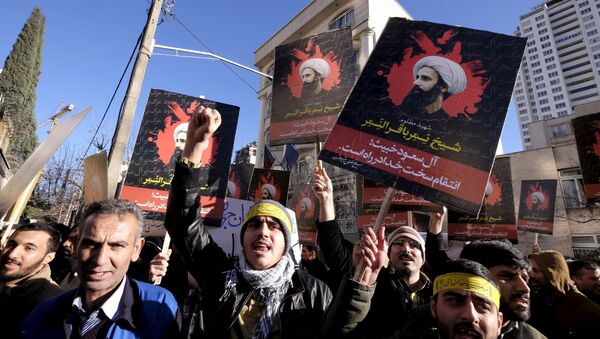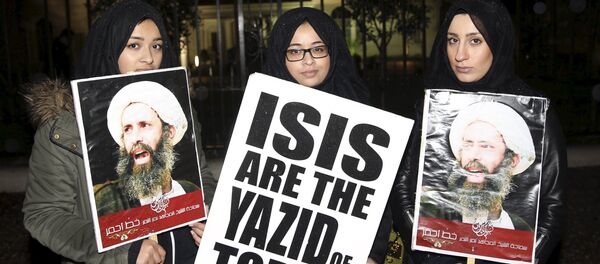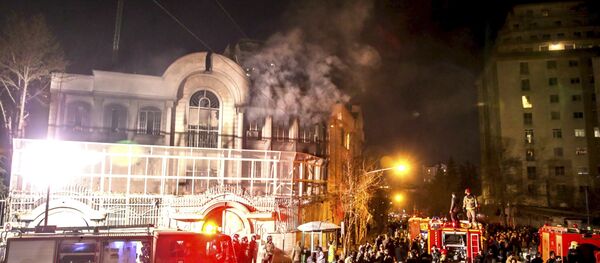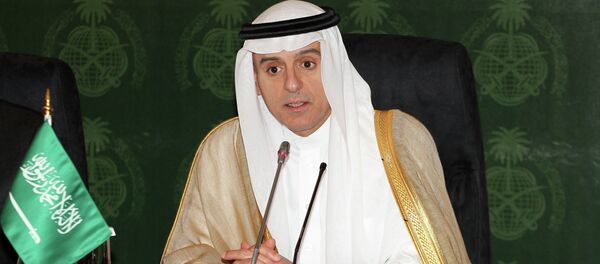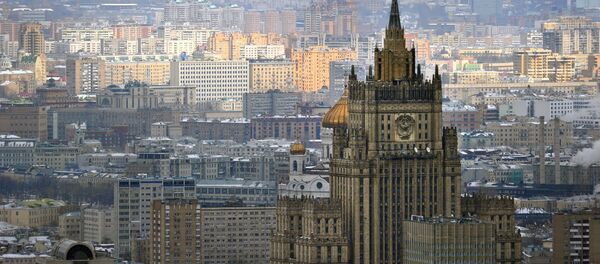On January 2, Saudi Arabia kicked off the New Year by conducting its largest mass execution in decades, putting 47 people, including prominent Shiite cleric Nimr al-Nimr, to death.
Al-Nimr, who was executed alongside alleged Sunni militants, was a known critic of the Saudi dynasty, calling for free elections and demanding that authorities respect Saudi Shias' rights, and was not known for inciting violence, an Amnesty International report has pointed out.
His death sparked anger and violent protests in Shia areas of Saudi Arabia, in Bahrain, Indian-controlled Kashmir, Pakistan, and Iran's capital of Tehran, where protesters stormed the Saudi Embassy and attempted to set the building on fire.
Commenting on American and European media coverage of the mass executions in his article for the foreign policy journal New Eastern Outlook, Cartalucci indignantly pointed out that missing from the reporting "was any of the indignation that usually accompanies articles on Wall Street, Washington, London, and Brussels' enemies when they carry out acts of perceived reprisals against mostly Western-backed political opponents –reprisals that usually include sentences much less severe than execution, for crimes usually much more severe than political activism."
In contrast to the "widespread, coordinated condemnation" that would have exploded among Western politicians, the media, and among human rights groups had the execution of a prominent political activist taken place in a regime which the West considers its enemy, in al-Nimr's case, Cartalucci notes, "there was only complicit silence."
"And while Western 'human rights advocacy' groups like Amnesty International did indeed point out that Saudi Arabia was putting to death a political prisoner, such reports were selectively glossed over, rendered as minor footnotes…or ignored altogether" in Western reports, with "the usual threats, sanctions and direct action wielded by Western politicians against nations like Syria, Russia, Iran, or China, utterly absent before and after Saudi Arabia's mass executions."
Ultimately, the analyst suggests, the fact that Western politicians and the media "selectively report on and exploit perceived human rights abuses in some nations, while intentionally muting, spinning, or otherwise covering up very real abuses by other nations, illustrates perfectly the West's selective enforcement of what it claims are its central organizing principles –democracy, freedom, and the defense of human rights."
'Executions at Home, Military Aggression Abroad'
"Indeed, the West's hypocrisy goes far beyond this more recent mass execution. This same complicit silence accompanies Saudi Arabia's US-European-backed war waged against neighboring Yemen. It is a war that has laid waste to many of Yemen's largest and most important cities, destroying its infrastructure, and cutting off the Yemeni people from economic and humanitarian resources beyond their borders through the seizure of their ports and a coordinated naval blockade."
Riyadh's war in Yemen, Cartalucci recalls, "is a war fought using Western weapons," with American and European tanks and aircraft, leading armored charges on the country's cities, and "raining destruction down upon populated areas, killing thousands, injuring tens of thousands, and displacing or otherwise affecting many more."
"Yet, instead of confronting Saudi Arabia –one of the West's oldest and most stalwart allies in the region for decades – the US has continued propping it up, defending it, and covering up for its numerous and ever-multiplying crimes against humanity," the analyst laments.
Riyadh Can't Kill Its Way Out of Adversity
Noting that the US and its allies are suffering setbacks in Syria and Iraq, while Riyadh struggles in Yemen, Cartalucci suggests that what "Saudi Arabia's growing body count" actually indicates is "a regime clinging to power amid increasing diversity."
"As the body count grows, adversity grows with it. Should the US fail in Syria [and] Iraq, and should its proxy war waged in Yemen with Saudi and other Persian Gulf forces also fail, it will not be long before the conflict finds itself pushed from the Levant and the southern-most tip of the Arabian Peninsula, and onto Saudi soil itself."
"If and when that day comes, the despots of the Persian Gulf and those tarnishing Turkey's reputation and global standings in Ankara will have wished they chose a multipolar world order to lend their backing to," Cartalucci concludes.

